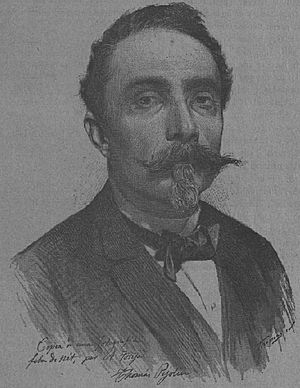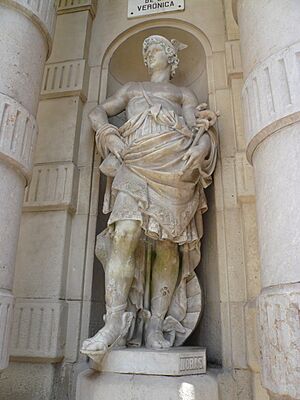Rossend Nobas facts for kids
Quick facts for kids
Rossend Nobas
|
|
|---|---|

Rossend Nobas i Ballbé (1891)
|
|
| Born | 1841 Barcelona
|
| Died | 5 February 1891 Barcelona
|
| Nationality | Spanish |
| Known for | Sculpture |
| Style | Naturalism and Realism |
Rossend Nobas i Ballbé was a talented Catalan sculptor and goldsmith. He lived and worked in the 1800s. Most of his amazing art can be found in Barcelona, Spain. You can see his sculptures in museums and public places all over the city.
Contents
About Rossend Nobas
Nobas was born in 1841. His father worked as a tinsmith, which means he made things from thin sheets of metal. Working with his dad taught Rossend a lot about metal early on. This experience helped him connect with the Maseria family, who were also involved in art. He stayed friends with them his whole life.
His Art School Days
Rossend Nobas studied at the Escola de la Llotja. This was a special school for art in Barcelona. His teachers were two brothers, Agapit and Venanci Vallmitjana. At school, Nobas learned how to sculpt by studying famous artists from the past.
After school, he joined the Vallmitjana brothers' workshop. He worked hard and became very skilled. Later, he opened his own art studio. Many students learned from him, including Josep Gamot, Josep Reynés, and Manuel Fuxà.
Exhibitions and Awards
Rossend Nobas showed his art in big exhibitions. In 1866, his work was seen at the famous Paris Salon. This was a very important art show!
In 1871, he won a second-class medal. This was for his sculpture called Wounded Bullfighter. He received this award at the National Exhibition of Fine Arts in Madrid. Then, in 1873, his Bust of Cervantes won an award. This happened at the World Exhibition in Vienna.
Sadly, Rossend Nobas passed away suddenly in 1891. He was only 50 years old.
Nobas's Art Style
Even though Nobas learned oil painting and watercolors, he loved sculpture the most. He made all kinds of sculptures. Some were huge, like monuments. Others were smaller, like busts (sculptures of a person's head and shoulders).
Naturalism and Realism
Nobas followed art styles called naturalism and realism. These styles meant that artists tried to make their art look as real as possible. Before photography was common, naturalistic art helped people see subjects exactly as they were.
Nobas was incredibly talented at sculpture. He was known for his amazing attention to detail. For example, he could sculpt tiny details like lace so perfectly that it looked real.
Famous Artworks
Rossend Nobas created many beautiful sculptures. Here are some of his well-known pieces and where you can find them.
| Date | Name of Work | Location |
|---|---|---|
| 1870 | Christ Crucified | |
| 1871 | Wounded Bullfighter | Museu Nacional d'Art de Catalunya |
| 1872 | Bust of Cervantes | |
| 1878 | Catalan Women | |
| 1879 | Bust of Marià Fortuny | |
| 1879 | Statue of General Josep Cabrinetty | Plaça Major de Puigcerdà |
| 1879 | Terracotta Busts of Cervantes, Milton, and Dante | |
| 1881 | Lions | Vestibule of Palau de la Generalitat de Catalunya |
| 1882 | Bust of Aristotle | Universitat de Barcelona |
| 1882 | Saint Thomas | |
| 1883 | La Dolorosa | Pamplona |
| 1883 | Statue of Mercury | Casino Mercantil de Barcelona |
| 1884 | Portrait Bust of Elisa Masriera | Museu Nacional d'Art de Catalunya |
| 1885 | Quadriga de l'Aurora | Cascada del Parc de la Ciutadella, Barcelona |
| 1888 | Monument to Rafael Casanova i Comes | Ronda Sant Pere, Barcelona |
| 1888 | Joan Güell i Ferrer | Barcelona |
See also
 In Spanish: Rossend Nobas para niños
In Spanish: Rossend Nobas para niños


